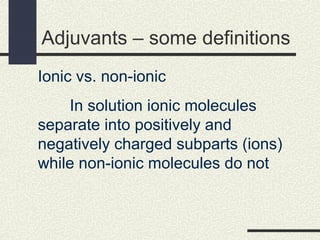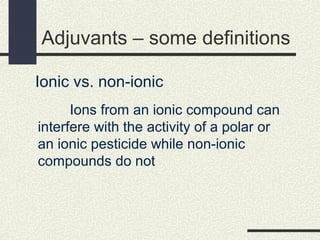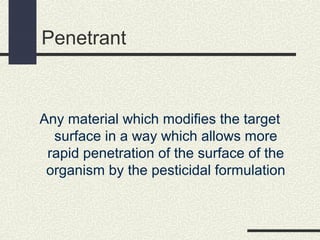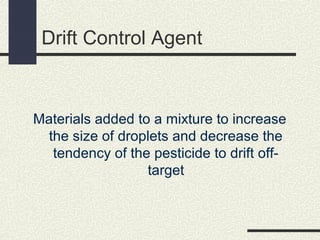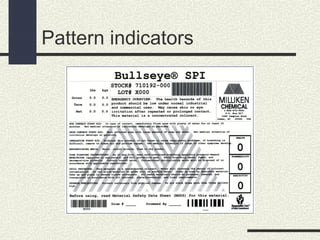10. adjuvants
- 1. Adjuvants An overview of the adjuvants in use in Region 8. BY Ali Rehman Afridi
- 2. Adjuvants Any material added to a pesticide mixture to modify its behavior; includes wetting agents, spreader stickers, other surfactants, penetrants, and drift control agents
- 3. Adjuvants – some definitions Polar vs. non-polar Polar compounds are compounds which have, due to their structure, have a definite imbalance in charge – resulting in a positive and a negatively charged end - + Polar bear?
- 4. Adjuvants – some definitions Polar vs. non-polar Non-polar compounds are compounds which have evenly distributed charge throughout their molecules
- 5. Adjuvants – some definitions R + - Polar Non-polar
- 6. Adjuvants – some definitions Polar vs. non-polar Polarity in a chemical aids in spreading the chemical over a polar surface or in penetrating one
- 7. Adjuvants – some definitions Ionic vs. non-ionic In solution ionic molecules separate into positively and negatively charged subparts (ions) while non-ionic molecules do not
- 8. Adjuvants – some definitions Ionic vs. non-ionic R + - Ions from an ionic compound Non-ionic molecule
- 9. Adjuvants – some definitions Ionic vs. non-ionic Ions from an ionic compound can interfere with the activity of a polar or an ionic pesticide while non-ionic compounds do not
- 10. Adjuvants
- 11. Surfactant Any material added to a pesticide formulation which is designed to modify the surface characteristics of the target organism
- 12. Surfactants
- 13. Wetting Agent Any material added to a pesticide mixture which serves to make the surface “wetter” so as to allow more rapid spread of the pesticide on the target – often called a ‘spreader’ Without wetting agent With a wetting agent
- 14. Wetting agents
- 15. Penetrant Any material which modifies the target surface in a way which allows more rapid penetration of the surface of the organism by the pesticidal formulation
- 16. Penetrants Mineral oil Napthenic oil Diesel oil
- 17. Penetrants Vegetable oil Organic silicone
- 18. Penetrants Products designed to create invert emulsions (oil in water)
- 19. Spreader Any material added to a pesticide formulation which improves the formulations ability to rapidly form a film on the target surface – generally interchanged with “wetting agent”
- 20. Sticker Any material added to a formulated pesticide which improves the ability of the pesticide to adhere to the target surface
- 21. Stickers
- 22. Drift Control Agent Materials added to a mixture to increase the size of droplets and decrease the tendency of the pesticide to drift off- target
- 24. Materials added to a formulation which marks a treated stem so that later identification of those treated vs. not treated is simplified Dyes in either amine or ester formulations are the most common pattern indicators






